Related Research Articles

The economy of Yemen has significantly weakened since the breakout of the Yemeni Civil War and the humanitarian crisis, which has caused instability, escalating hostilities, and flooding in the region. At the time of unification, South Yemen and North Yemen had vastly different but equally struggling underdeveloped economic systems. Since unification, the economy has been forced to sustain the consequences of Yemen's support for Iraq during the 1990–91 Persian Gulf War: Saudi Arabia expelled almost 1 million Yemeni workers, and both Saudi Arabia and Kuwait significantly reduced economic aid to Yemen. The 1994 civil war further drained Yemen's economy. As a consequence, Yemen has relied heavily on aid from multilateral agencies to sustain its economy for the past 24 years. In return, it has pledged to implement significant economic reforms. In 1997 the International Monetary Fund (IMF) approved two programs to increase Yemen's credit significantly: the enhanced structural adjustment facility and the extended funding facility (EFF). In the ensuing years, Yemen's government attempted to implement recommended reforms: reducing the civil service payroll, eliminating diesel and other subsidies, lowering defense spending, introducing a general sales tax, and privatizing state-run industries. However, limited progress led the IMF to suspend funding between 1999 and 2001.
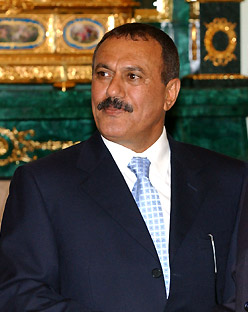
Ali Abdullah Saleh al-Ahmar was a Yemeni politician who served as the first President of Yemen, from Yemeni unification on 22 May 1990 to his resignation on 25 February 2012, following the Yemeni Revolution. Previously, he had served as President of the Yemen Arab Republic, or North Yemen, from July 1978 to 22 May 1990, after the assassination of President Ahmad al-Ghashmi.
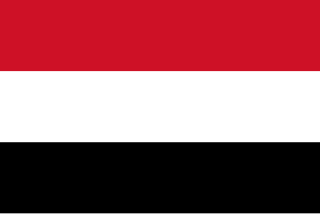
Yemen, officially the Republic of Yemen, is a country in Western Asia. It is situated on the southern end of the Arabian Peninsula, and borders Saudi Arabia to the north and Oman to the northeast and shares maritime borders with Eritrea, Djibouti, and Somalia. Yemen is the second-largest Arab sovereign state in the peninsula, occupying 555,000 square kilometres, with a coastline stretching about 2,000 kilometres. Its constitutionally stated capital, and largest city, is Sanaa. As of 2021, Yemen has an estimated population of 30.4 million.

The Yemen Arab Republic, also known simply as North Yemen or Yemen (Sanaʽa), was a country from 1962 to 1990 in the northwestern part of what is now Yemen. Its capital was at Sanaa. It united with the People's Democratic Republic of Yemen on 22 May 1990 to form the current Republic of Yemen.

South Yemen (Arabic: اليمن الجنوبي, romanized: al-Yaman al-Janubiyy), officially the People's Democratic Republic of Yemen (جمهورية اليمن الديمقراطية الشعبية, Jumhūriyat al-Yaman al-Dīmuqrāṭīyah al-Sha'bīyah), also referred to as Democratic Yemen (اليمن الديمقراطي, al-Yaman al-Dīmuqrāṭīyy) or Yemen (Aden) (اليمن (عدن), al-Yaman ('Adin)), was a communist state that existed from 1967 to 1990 as a state in the Middle East in the southern and eastern provinces of the present-day Republic of Yemen, including the island of Socotra.
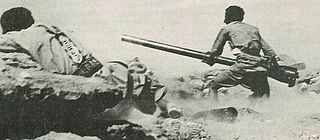
The North Yemen Civil War was fought in North Yemen from 1962 to 1970 between partisans of the Mutawakkilite Kingdom and supporters of the Yemen Arab Republic. The war began with a coup d'état carried out in 1962 by revolutionary republicans led by the army under the command of Abdullah as-Sallal, who dethroned the newly crowned King and Imam Muhammad al-Badr and declared Yemen a republic under his presidency. The Imam escaped to the Saudi Arabian border where he rallied popular support from northern Shia tribes to retake power, escalating rapidly to a full-scale civil war.
Abdul Majeed al-Zindani is a leading Islamist, founder and head of the Iman University in Yemen, head of the Yemeni Muslim Brotherhood political movement and founder of the Commission on Scientific Signs in the Quran and Sunnah, based in Saudi Arabia. He has been described by Daniel Golden of the Wall Street Journal as "a charismatic Yemeni academic and politician." and by CNN as "a provocative cleric with a flaming red beard".
The Houthi insurgency in Yemen, also known as the Houthi rebellion, the Sa'dah War, or the Sa'dah conflict, was a military rebellion pitting Zaidi Shia Houthis against the Yemeni military that began in Northern Yemen and has since escalated into a full-scale civil war. The conflict was sparked in 2004 by the government's attempt to arrest Hussein Badreddin al-Houthi, a Zaidi religious leader of the Houthis and a former parliamentarian on whose head the government had placed a $55,000 bounty.

The Houthi movement, officially called Ansar Allah and colloquially simply Houthis, is an Islamist political and armed movement that emerged from Saada Governorate in North Yemen in the 1990s. The Houthi movement is a predominately Zaidi Shia force, whose leadership is drawn largely from the Houthi tribe.

Abdrabbuh Mansur Hadi is a Yemeni politician and former field marshal of the Yemeni Armed Forces who served as the president of Yemen from 2012 until 2022, when he stepped down and transferred executive authority to the Presidential Leadership Council, with Rashad al-Alimi as its chairman. He was the vice president to Ali Abdullah Saleh from 1994 to 2012.

The Yemeni Revolution (intifada), also known as the Yemeni Revolution of Dignity followed the initial stages of the Tunisian Revolution and occurred simultaneously with the Egyptian Revolution of 2011 and other Arab Spring protests in the Middle East and North Africa. In its early phase, protests in Yemen were initially against unemployment, economic conditions and corruption, as well as against the government's proposals to modify Yemen's constitution. The protesters' demands then escalated to calls for the resignation of Yemeni President Ali Abdullah Saleh. Mass defections from the military, as well as from Saleh's government, effectively rendered much of the country outside of the government's control, and protesters vowed to defy its authority.

The Vice President of the Republic of Yemen is the second highest political position in Yemen.
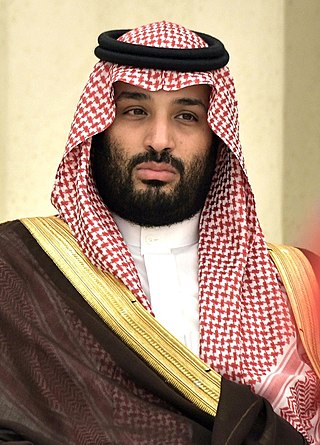
Mohammed bin Salman Al Saud, colloquially known by his initials MBS or MbS, is Crown Prince and Prime Minister of Saudi Arabia. He also serves as the chairman of the Council of Economic and Development Affairs and chairman of the Council of Political and Security Affairs. He is considered the de facto ruler of Saudi Arabia, being deemed as such even before his appointment as prime minister in 2022. He served as minister of defense from 2015 to 2022. He is the seventh son of King Salman.

The Yemeni civil war is an ongoing multilateral civil war that began in late 2014 mainly between the Rashad al-Alimi-led Yemeni government and the Houthi armed movement, along with their supporters and allies. Both claim to constitute the official government of Yemen.

On 26 March 2015, Saudi Arabia, leading a coalition of nine countries from West Asia and North Africa, launched an intervention in the Yemeni Civil War in response to calls from the president of Yemen Abdrabbuh Mansur Hadi for military support after he was ousted by the Houthi movement. The conflict ignited between the government forces, the Houthi rebels and other armed groups after the draft constitution and power-sharing arrangements collapsed, despite progress in the political transition led by the United Nations at that time, leading to an escalation of violence in mid-2014. The Houthis and allied units of the armed forces seized control of Sana’a and other parts of the country in September 2014 and in the following months. This prompted President Hadi to ask Saudi Arabia to intervene against the Iranian-backed Houthis.

The Houthi–Saudi Arabian conflict is an ongoing armed conflict between the Royal Saudi Armed Forces and Iran-backed Yemeni Houthi forces that has been taking place in the Arabian Peninsula, including the southern Saudi regions of Asir, Jizan, and Najran, and northern Yemeni governorates of Saada, Al Jawf, and Hajjah, since the onset of the Saudi Arabian-led intervention in Yemen in 2015.

The Islamic State – Yemen Province is a branch of the militant Islamist group Islamic State (IS), active in Yemen. IS announced the group's formation on 13 November 2014.
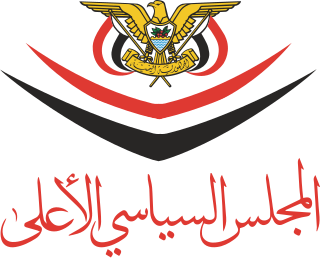
The Supreme Political Council is a largely unrecognised executive body formed by the Houthi movement and the General People's Congress (GPC) to rule Yemen. Formed on 28 July 2016, the presidential council consists of nine members and was headed by Saleh Ali al-Sammad as president until his death from a drone air strike on 19 April 2018 with Qassem Labozah as vice-president. The territory that it rules consists of the former North Yemen, which united with South Yemen in 1990.

The Battle of Marib is an ongoing battle that erupted since February 2021 following the advance of the Houthis towards the city of Marib, the capital of Marib Governorate in Yemen controlled by the Cabinet of Yemen.
References
- ↑ "Yemen". World Statesman Encyclopedia. Retrieved 25 October 2022.
- ↑ "Countries Y to Z". Rulers.org. Retrieved 25 October 2022.
- ↑ Graca, John V. Da (18 June 1985). Heads of State and Government. Springer. ISBN 978-1-349-07999-5.